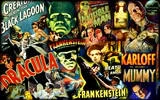
James Michael Bernard (20 September 1925 – 12 July 2001) was a British film composer.
He was a pupil at Wellington College which had previously been attended by the future actor, Christopher Lee, who starred in many of Hammer's horror films, for which he wrote the score. While still a schoolboy, Bernard met Benjamin Britten when the composer visited the school to consult with the then art master, Kenneth Green, about the stage designs for Peter Grimes.[1] Britten took interest in an inter-house music composition, and advised Bernard on a composition he was writing. The two stayed in touch during Bernard's service in the RAF from 1943 to 1946, and Britten encouraged him to learn the principles of composition. After being demobbed Bernard went to the Royal College of Music, studying under Imogen Holst and Herbert Howells. He graduated in 1949. In 1950 Britten approached him to copy out the vocal score of his new opera Billy Budd for his publishers Boosey & Hawkes. While doing this he stayed with Benjamin Britten at Aldeburgh. He went to the opening night with Benjamin Britten's housekeeper and the librettist, E. M. Forster.
Around the time Bernard graduated from the RCM, he met the writer and critic Paul Dehn with whom he started a professional relationship, but who also became his life partner. Paul Dehn asked James Bernard to collaborate with him on the original screen story for the Boulting Brothers film Seven Days to Noon (1950). For this Paul Dehn and James Bernard shared the 1952 Academy Award for the Best Writing, Motion Picture Story.
Undoubtedly his best remembered music score for Hammer Films was, Horror of Dracula (1958) featured a motif based on the sound Dra-cu-laaaaa. Other memorable Hammer scores include The Curse of Frankenstein (1957), The Kiss of the Vampire (1962), The Plague of the Zombies (1966) and The Devil Rides Out (1968).
His music was distinct for its clashing harmonies, often created by doubling a motif a tone higher, as in his famous Dracula theme. His music was also frenzied and pacey at times, frequently making use of percussion such as timpani and snares. The Devil Rides Out (1968) and The Plague of the Zombies (1966) are good examples of this. However, he could also write lushly romantic melodies, such as appear in Frankenstein Created Woman (1967), Taste the Blood of Dracula (1970) and Scars of Dracula (also 1970). Unlike the majority of film composers, Bernard orchestrated almost all of his work.[2]
Paul Dehn died in 1976. Working on She (1965), Bernard first met the man who later became his second life partner, actor Ken McGregor, with whom he lived in Jamaica until McGregors death there in 1994. Bernard then moved back to London and lived there for the remainder of his life.[3]
In later years, he was called upon by silent film historian Kevin Brownlow to write an original score for F. W. Murnau's classic silent horror Nosferatu (1922/1997) and for Brownlow's documentary Universal Horror (1998) on the horror films of the American studio. He also wrote the score to Paul Cotgrove's 2001 short horror film "Green Fingers" (starring Hammer veteran actresses Ingrid Pitt and Janina Faye). David Huckvale's critical biography of the composer, James Bernard - Composer to Count Dracula was published by McFarland in 2006.
References[]
- ↑ Huckvale, David. Hammer film scores and the Musical Avant-Garde: p. 106
- ↑ Tom Vallance "James Bernard", The Independent, 18 July 2001. Retrieved on 27 March 2009.
- ↑ Alexander Gleason "Obituary: James Bernard", The Guardian, 20 August 2001. Retrieved on 27 March 2009.
- Huckvale, David. Hammer film scores and the musical avant-garde. McFarland, 2006. ISBN 978-0-7864-3456-5
External links[]
- James Bernard at the Internet Movie Database
- James Bernard at Allmusic
| |||||

|
This page uses content from Wikipedia. The original article was at James Bernard (composer). The list of authors can be seen in the page history. As with Universal Monsters Wiki, the text of Wikipedia is available under the GNU Free Documentation License. |